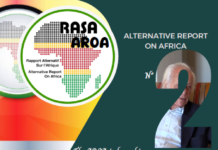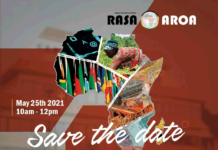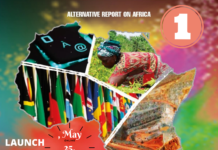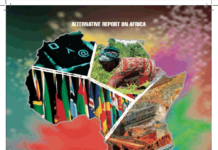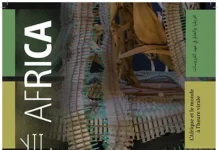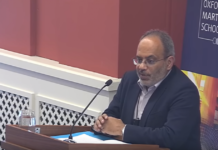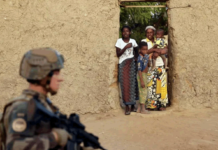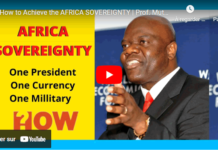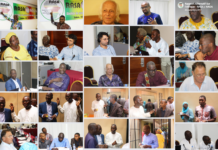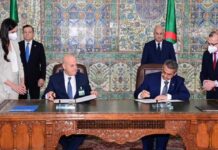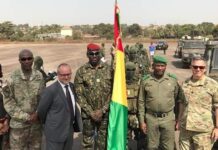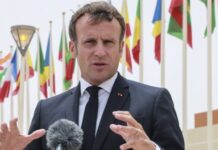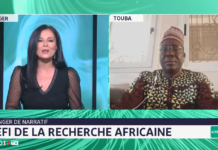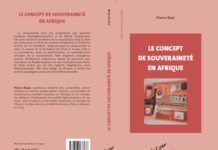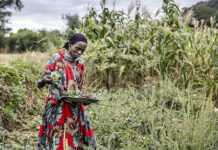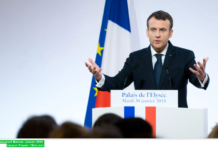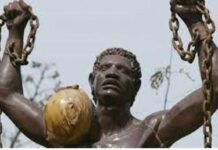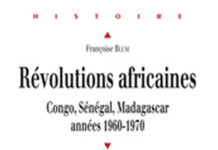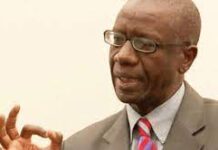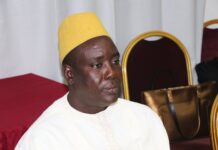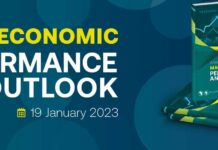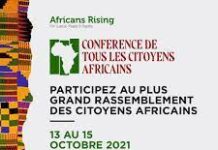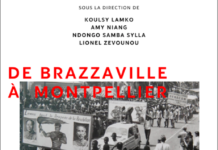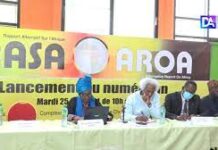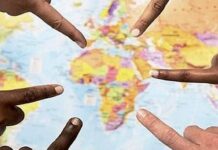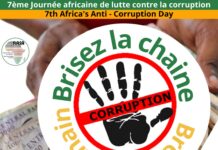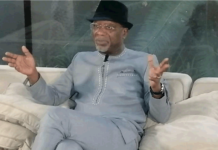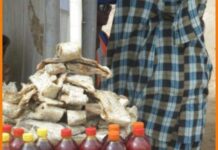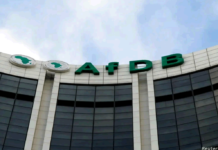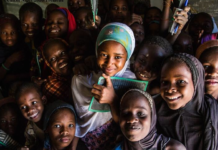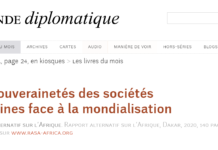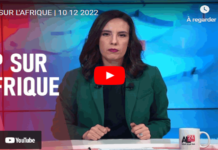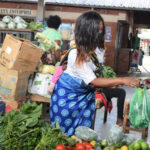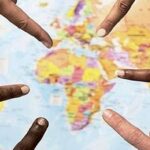The Report on Africa (RASA) aims at the ideological and epistemological reversal of analyses on the continent, the deepening and diversification of the issues and areas addressed, and the indicators for measuring progress etc…
The Report on Africa Alternatives (RASA) is a key new initiative of renowned African and international institutions (Enda Tiers Monde, Third World Forum, CODESRIA, TRUSTAFRICA, International Institute for Democracy and Electoral Assistance (IDEA), AFARD (African Women’s Research and Development Network), African Futures Institute (AFI), Rosa Luxembourg Foundation, LEGS AFRICA, Alliance for Rebuilding Governance in Africa (ARGA), West Africa Think tank (WATHI), African Governance Institute (AGI), Institute for Prospective Agriculture and Rural Development (IPAR), etc.). ).
Each of these institutions has made an immeasurable intellectual, strategic and financial contribution to making this initiative possible.
In the face of the kaleidoscope of reports on Africa classifying the continent’s countries according to exogenous and neo-liberal criteria and indicators (Doing Business, World Bank, IMF), the Alternative Report on Africa (RASA) aims at the ideological and epistemological reversal of analyses on the continent, the deepening and diversification of the issues and fields addressed, and the indicators for measuring progress and African sovereignty. The initiative, which is also supported by high-level African personalities and scientists, produces reports that truly reflect the sensibilities and experiences of Africans in the various environments in which they find themselves.
Its objective is to contribute decisively to the consolidation of the transformations at work in African societies and institutions towards autonomy and sovereignty. The aim is to make visible the dynamics and mutations at work on the continent, particularly those that are carried by Africans in their majority and their diversity. In this way, RASA wants to make visible and strengthen the real societal transformations that are driven by a spirit of self-determination, innovation and the conquest of autonomy, which are not sufficiently reflected in the reports on Africa and their instruments.
Thus, the debates and spaces for defining strategy or policy will be fed and enriched by endogenous knowledge that makes sense to Africans. This knowledge will be produced on a credible basis, valuing African innovation and empowerment.
RASA is also a response to the lack of foresight capacity of African institutions and actors who are driving the dynamics of the continent. It will inform African projections of the future in a context of a return to long-term planning at national and continental levels.
The RASA will be an instrument to measure the progress of long-term plans and the sovereignty shortcomings of these future projections.
The Africa Action Report (AAR) Number One questions the state of affairs and desirable developments on the African continent through the prism of sovereignty. Its publication comes at a time of severe health and economic crisis, the confirmation of our intellectual and strategic dependence as the recent Paris summit on African economies has demonstrated.
The imperatives of managing the pandemic have, once again, highlighted the difficulties of African countries in their ability to transform the situation and ensure the well-being of the greatest number of their population. The report rightly considers that the issue of African sovereignty revives the crucial question of the right to self-determination.
This quest for sovereignty takes place in a context of globalisation where countries are bound by rules and principles of international law that they have difficulty in controlling, while transnational corporations transgress them with the complicity of political elites. This makes African strategies in terms of sovereignty not always legible, if they are defined at all. In this perspective, sovereignty is understood in its popular and national dimensions.
True to their initial ambition, the initiators of this report seek to position and deepen a radically new approach that places real socio-economic dynamics, popular innovations, intangible resources, the centrality of culture, the bio-economic link with nature, and the powers of proximity at the centre of the perspective.
The Report is structured around seven main axes, each of which visits different dimensions of the sovereignty of African societies in the face of globalisation.
In the first axis, the authors show that sovereignty is grappling with imperialism and hegemony from the outside on the one hand, and in conflict with its national and popular dimensions from below.
African countries are more concerned with the destabilising limits of free trade than with its benefits. The precepts of the neoliberal doxa, apart from reducing the meagre revenues of governments, reinforce the subordinate positions of developing countries.
In contrast to the ‘classical’ literature on sovereignty, which focuses on national sovereignty, this report mobilises the concept of popular sovereignty, in order to gain a deeper understanding of the actual mechanics behind social transformations. The reason for including popular sovereignty in the definition refers to the inviolable part of sovereignty held by each citizen and the potential of the groups it enables.
This differentiates it from national sovereignty, which is abstract and fictitious.
In this respect, the Covid-19 crisis has been an analyzer in terms of its impact and an opportunity to highlight the challenges of this quest for sovereignty. After highlighting its economic, health and social consequences, the authors show that the option dictated by the Organisation for Economic Co-operation and Development (OECD) is that of a return to growth based on a strategy of emergence through the promotion of Foreign Direct Investment (FDI), the development of Special Economic Zones (SEZs), the lowering of customs duties, etc. This return to ‘normality’ is the result of a series of measures taken by the OECD and the World Bank.
This return to « normality » is synonymous with remaining in a globalised economic system that has proved incompatible with the economic and political sovereignty of African countries. It is in this sense that this report concludes that a lucid path for Africa in the future is that of disconnection as advocated by Samir Amin. In fact, sovereignty cannot be exercised without a strategy of disconnection from the globalised capitalist system.
The second axis deals with economic sovereignty.
First, it is recalled that Africa’s economic policy orientations continue to be prescribed by international institutions such as the International Monetary Fund (IMF), the World Bank (WB), the World Trade Organisation (WTO), the OECD, the World Economic Forum, among others. Secondly, the authors demonstrate that the high dependence on FDI has facilitated the offensive of transnational firms that African states are seeking to attract, reflecting a windfall effect. This path is not a guarantee of economic sovereignty, since multinationals have a great deal of power which they use to dictate economic policies that strengthen their economic and financial power at the expense of the welfare of the majority of Africans. The report also argues that Africa is much more dependent on the outside world for its ideas on the operational meaning of socio-economic development and how it should be achieved.
In this sense, it postulates that « development in its economic dimension cannot be initiated without insisting on the importance of the articulation to be found with ‘relational capital’, which is one of the focal points through which we must think about the so-called ‘informality’ in African productive dynamics and the urgent need to increase the production and dissemination of knowledge intrinsic to Africa ». In putting forward such a thesis, RASA advocates the construction of new paradigms, the valorisation of endogenous knowledge, the elaboration of a new methodological apparatus and a break with the linearity that locks the continent into the conceptual and methodological straitjacket of economic neo-liberalism.
However, in the face of the neoliberal capitalist offensive, African states are trying to organise resistance through pan-African initiatives. The launch of the FTAA on 1 January 2021 is welcomed with reservations
in this report. The authors argue that the FTAA should be an instrument of economic decolonisation and can help cushion the effects of the Economic Partnership Agreements signed with the European Union, provided that the agreements previously concluded are made null and void. An initiative such as the Africa Mining Vision remains marked by a neo-colonial approach and has raised more pessimism due to its narrow and unambitious vision as a lever for structural change.
At the country level, this report recommends a number of ways to regain food sovereignty, a strong and autonomous industrial fabric and a less extroverted management of mining resources. Thus, for food sovereignty, it is recommended that agricultural development should be based on four pillars: a radical reform of agricultural land tenure; a guarantee of sustainably remunerative agricultural prices; the promotion of agro-ecological production systems; and compensation for increases in agricultural prices for consumers and changes in their eating habits. In the area of industry, the report proposes to explore a strategy of moving away from insertion in global value chains.
In this perspective, more specifically African countries should focus on the development of the textile industry, which has been the basis for the industrialisation of most countries in the South, to supply the domestic market. However, it will be necessary, through educational protectionism, to accompany this nascent industry. Finally, in order to reverse neo-colonial extraversion, the management of extractive and land resources must follow a systemic approach to transformation, which requires activating three policy levers: developing strategic business clusters; promoting regional production networks; and strengthening the ability of companies to prosper in new markets.
Finally, to assess economic sovereignty, the authors reviewed China-Africa cooperation and asked whether Africa was condemned to remain in a role of reservoir of raw materials and outlets for Chinese industrial hegemony. They argue that Africa must find ways to make better use of its natural resources by
They believe that Africa must find ways to make better use of its natural resources by reinventing local value-adding strategies. The first step for Africa is to gain financial autonomy and rely on its own infrastructure by promoting its private sector.
Monetary sovereignty, which is the subject of the third axis of this report, has been considered from the perspective of the post-CFA franc era, but also from the point of view of mobilising real resources, the basis of sovereign development.
This analysis is based on a diagnosis of the existing situation in WAMU in terms of monetary sovereignty and a forecast of the creation of a single ECOWAS currency: the Eco.
The WAMU zone is first analysed as a non-optimal monetary zone. Subsequently, a much more critical view focused on the issue of monetary sovereignty through the prism of modern monetary theory. Monetary theory defines monetary sovereignty in terms of the following four conditions: having a national or federal currency issued by its own central bank, levying taxes in its own currency, having no foreign currency debt and having a flexible exchange rate. On the basis of this theory, WAMU countries do not have monetary sovereignty. Moreover, according to this report, this zone is a handicap for the mobilisation of real resources of its member countries. In addition to the fact that the functioning of the franc zone depends on maintaining/reinforcing dependence on France and the European Union, the focus on public deficits in the WAMU zone implies a marginal contribution of governments to the accumulation of private sector financial wealth. Ideally, the public deficit should be financed in domestic currency and directed to the domestic private sector with a view to boosting domestic productive capacity. But this option is a blind spot for a currency area that defends a fixed parity for a currency under the tutelage of a foreign country.
With regard to the analysis of possible options for the establishment of the ECO, the single currency of the ECOWAS region, two approaches have been analysed in this report. The first approach is pragmatic and analyses the different scenarios for a transition to the ECO. The first scenario envisages ECO as a simple avatar of the CFA franc. In this case, the perimeter of the monetary zone is enlarged without impacting on sovereignty, which remains confiscated by the « guarantor », the European Central Bank.
The second scenario assumes a « real ECO » based on real convergence, that of GDP/head and no longer, as in the case of the CFA-ECO, on the respect of nominal convergence criteria. In this scenario, the ECOWAS economies would be obliged to converge towards the top three countries of Cape Verde, Nigeria and Ghana. The third scenario is based on the hypothesis of a return to the WAMZ philosophy as envisaged in 2000 in Accra (Ghana). Six English-speaking West African countries (Gambia, Ghana, Guinea, Liberia, Nigeria, Sierra Leone) have announced their intention to create a second monetary zone in West Africa with the ECO as its currency, alongside the WAMU. This configuration would result in the creation of an « ECO-Naira », under the leadership of Nigeria, which was stung by the Francophone initiative of an « ECO-CFA » that could be forced through. Finally, the last scenario stipulates the creation of the ECO as a common currency, based on national currencies.
As for the question of economic convergence, the RASA concludes that it is « neither a prerequisite nor a consequence » of the creation of a single currency. Nevertheless, the success of this leap into the unknown, without a safety net, presupposes the effectiveness of a certain number of factors, including: the intensification of trade within ECOWAS, an increase in risk-sharing mechanisms and a deep and shared conviction of a common destiny.
A second, more critical approach is that the ECOWAS single currency, as it has been conceived so far, would only be a symbolic alternative to the CFA franc.
It would not allow for a better mobilisation of domestic resources since it is based on the same monetarist logic as the CFA franc – with the priority given to the fight against inflation on the backdrop of a split between monetary and fiscal policy. Moreover, without the precondition of federal government (or at least advanced forms of fiscal solidarity), a possible ECOWAS single currency would pose similar problems to those of the CFA franc.
Cultural sovereignty was the subject of the fourth axis of this report.
A cross-cutting pan-Africanist approach is adopted to highlight the culture-economy relationship, which has been developed in three stages. The first stage consisted of noting the failures of neo-liberal developmental models, which are at once exogenous, acultural and Western-centred, by putting into perspective the failures of the ‘all-market’ and the costs of a certain cultural alienation. From this point of view, it turns out that the cost of acultural economic models and of a certain colonial mimicry of knowledge has been the depreciation of the very old attractiveness of African cultural products in the world. In a second stage, culture is seen as a strategic idiosyncratic resource for the African economy.
In this case, on the basis of endogenous knowledge, upstream artefacts, mentifacts and sociofacts are to be judiciously exploited for potentially virtuous applications in crafts, agriculture, health, pharmacopoeia, architecture and biological uses.
Sectors such as fashion, design, cosmetics, or construction are concerned. Finally, a last stage proposes to culturalise pan-Africanism in action, which would provide an indispensable contribution to the rooting of sovereignties.
In fact, the economic version of Pan-Africanism, which declines the quest for solidarity, unity and emancipation into the promotion of African economic, monetary and diasporic integration, should accentuate its strategy in the cultural industries and crafts.
By further culturalising the paradigm of economic pan-Africanism through a significant re-dimensioning of the chapters devoted to languages, to the economy of culture, which could boast the best African performances internationally (crafts, works of art, music, gastronomy, board games, African textiles, etc.), the chances of success of an authentic and credible pan-African project would be substantially multiplied.
In the context of the development of computer networks, the advent of the Internet and the birth of cyberspace, the RASA considered it necessary to examine the notion of sovereignty in the light of the digital revolution.
Digital sovereignty, which is the subject of the fifth axis of this report, is seen as the ability of Internet actors and users to conduct their activities in complete freedom from the diktat of the state or large transnational corporations. Although Africa is in a situation of dependence in the digital and technological field, RASA believes that it can rise to the challenge and that this will require investment in different dimensions of digital sovereignty. Firstly, the autonomous management of country code top level domains (ccTLDs) by national and regional structures should promote the addressing of web or mail servers in favour of their names and not those of generic top level domains (gTLDs) in « .com », « .net » or « .org ». Secondly, the RASA advocates breaking with the use of proprietary software by implementing public policies that make the use of open source software mandatory in the public and para-public sector, especially in the education sector.
Thirdly, with regard to the use of cloud computing, far from promoting the limitation of its use, the authors of this report propose that African states give themselves the means to create their own cloud by investing in the creation of data centres capable of hosting the applications, data and services they need for their security and environment. Fourth, digital sovereignty must also address the worrying issue of IT security. This has always been treated as a poor relation at a time when African countries are invited to ratify the African Union Convention on Cybersecurity and the Protection of Personal Data in order to make it applicable as a legal framework to establish « a trusted digital space for electronic transactions, the protection of personal data and the fight against cybercrime ». In addition to the eleven African countries that already have computer emergency response teams, the other countries of the continent should also get involved.
The sixth axis focused on political sovereignty and for the RASA, it appears that the federal state is the sine qua non condition for recovering internal and external sovereignty.
Thus, internal sovereignty will necessarily require the establishment of a politically centralised federal state run on a collegiate basis. In order to ensure the territorial integrity of the large entity created, this new state will have continental armed forces. Economically, Africa being the ‘energy and raw material centre of the world’ according to Cheikh Anta Diop, the federal state, conceived on the model of the former Soviet Union and the United States, will be able to judiciously manage these resources for the benefit of Africans.
This unified macro-state will mint its own currency, with a single issuing institution. Priority will be given to industrialisation and the mechanisation of agriculture. Finally, this federal state will make it possible to recover internal sovereignty, provided that it is viable. For this to happen, it is important, according to the RASA, that the links between the different states are binding.
Furthermore, in the same vein as Cheikh Anta Diop, it is important to stress that the political unification of African countries must precede their economic regionalisation.
With regard to external sovereignty, the RASA believes that the federal state needs to acquire nuclear weapons. This would allow it to deal with economic development without fear of destabilisation.
The federal state should also act as a shield against the invasion of states that see Africa as their ideological expansion ground, in order to put an end to all forms of paternalism. On the economic front, a strong federal state will have to direct investments according to the needs of its industrialisation plan and thus of its development.
Political sovereignty was also examined by reviewing the state of continental integration and the current state of the left and the pan-Africanist movement. Obstacles include the reluctance of African states to cede a portion of their sovereignty to the main organs of the African Union, the persistence of conflicts in some parts of the continent, the narrowness of markets, poor infrastructure networks, etc.
Secondly, after having reviewed the very promising experiences towards a post-colonial transition in Africa, notably by revisiting the history of Thomas Sankara, the observation is that the pan-Africanist vision must be deepened by a reflection on the nature of the organisational framework that is the most suitable for carrying out a project of radical transformation of African societies.
In this sense, RASA calls for the construction of a broad progressive front, backed by an alternative societal project of radical transformation of the capitalist and neo-colonial order.
This requires us to abandon our dogmatic convictions, which often prevent the search for consensus on the essentials, while contributing to destabilising praiseworthy initiatives or disproportionately exacerbating secondary or even minor contradictions.
Finally, the RASA advocates a break with the mimicry that consists of systematically trying to impose experiences from specific environments with different historical realities, even if certain practices may have a universal dimension.
The RASA has also outlined the foundations and contours of a real power for decomplexed and sovereign African states.
To this end, it was important to deconstruct the vision of power at a time when crises of all kinds are constantly revealing the « powerlessness of the powerful ». The power of tomorrow on which African countries should rely would be one that articulates the short, medium and long term in thought and action, as well as in their combined effects and impacts. Moreover, power must embody a « way of being » and a « way of acting » based on values, principles and a method that guarantee its legitimacy, effectiveness and sustainability. In this sense, the concept of smart power should be further developed. In fact, the smart power that RASA calls for African countries is not one that unties, but one that links :
material and immaterial development;
actors, issues and scales;
the reinvention of power and the rethinking of global governance;
the complexity of the world and decision-making intelligence.
To conclude, this report has highlighted the challenges and prospects of an African post-capitalist transition. These are the result of an analysis that suggests that the use of technological advances will, to a large extent, determine the nature of social life in the post-capitalist era. What is needed, therefore, is for Africans to reconnect with radical traditions of struggle, nationally and globally, for the emergence of a new society. To renew long-term solidarity in order to advance the struggle of the popular classes. Thus, for Africa, there is an urgent need to deepen and broaden the pan-African experiences leading to the creation of the federal state, which alone will be capable of counteracting the current strategies of domination based on the fragmentation of our peoples into weak neo-colonial states, which are incapable, taken individually, of guaranteeing the conditions of their own survival, or of having sufficient room for manoeuvre to negotiate the terms of their insertion into the world system in a sovereign manner.
Dr Cheikh Guèye,
Permanent Secretary of the RASA Alternative Report on Africa


